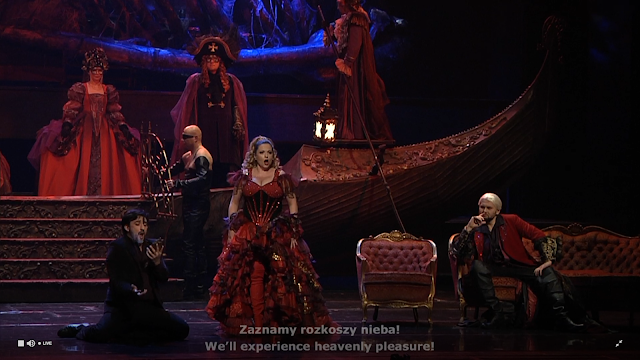Wrocław Opera (live stream), 16/01/2021
Offenbach : Les contes d'Hoffmann
Chorus and Orchestra of Wrocław Opera
Bassem Akiki
It's been a little complicated lately for me to keep up with what is being streamed live now, particularly as there is less of it than in the summer and autumn of last year. However, this suddenly showed up, and I rarely miss a Hoffmann if I can possibly avoid it, it's one of my favourite operas. Like all live performances these days, it was performed without an audience, and the orchestra occupied the full extent of the stalls, but apart from a slightly small chorus, the performance otherwise appeared quite normal, and the chorus size may indeed be standard for this company. The only thing I know about Wrocław Opera is that it is now directed by Mariusz Kwiecień, illustrious baritone recently obliged to retire from performance early for health reasons.
With Hoffmann, the first issue is always the edition. Wrocław has chosen an extremely classic form, the Choudens edition almost exactly as was standard before the major recoveries of missing pages in the 70s. There's one completely inexcusable cut in the "Trio de la mère" in Act 2, the reasons for which escape me utterly, a few bars towards the end of Act 1 that didn't quite gel with the traditional version I know, and much of the Epilogue is excised, but otherwise, it was musically a real blast from the past.
Curiously, because of the cut of the Epilogue, it becomes clear that Niklausse is not the Muse - she appears as a distinct figure in the old melodrama - and the whole issue of Stella being three-in-one went completely unstated. That was perhaps the most unexpected quirk of the production. Otherwise, Waldemar Zawodziński's production was enjoyably gothic. The Prologue was extremely sparse, straight to the point, in relatively modern dress. The first act was similarly in fairly modern dress, between walls carved with Latin and equations, but the Munich act looked more Victorian, set amongst mirrored walls and with a silver piano worthy of Liberace, while the third act again moved back a century, a Venetian debauchery of black leather, reds and golds, dominated by two floating gondolas. Apart from the issue of the Muse, there were few surprises in the direction of actors - a particularly camp Franz, and Dr. Miracle's Dementor assistants stood out somewhat.
 |
| L to R : Charles Castronovo (Hoffmann), Eliza Kruszczyńska (Giulietta), Jerzy Butryn (Dapertutto) Act 3, Les contes d'Hoffmann Wrocław Opera, 2021 (screenshot) |
The first part, Prologue and Act 1, was a little odd. Bassem Akiki's fluctuations in tempo made things seem stilted, even halting, with Charles Castronovo's Hoffmann the only singer sounding both idiomatic and at ease in his role. This was Castronovo's first Hoffmann in a fully staged production (he has sung it in concert before), and it's a part that suits him quite well. I'm used to hearing Castronovo in slightly lighter roles, but he has reached that stage of his career where it's not surprising to see him shifting into heavier territory - he will, apparently, be adding Werther to his repertory too this year. He's a convincing Hoffmann, handling the frequent shifts of mood very well, the voice very stable and sure, and as pleasing to hear as Castronovo is to look at. After the first interval, Akiki and the orchestra relaxed into the music, and everything flowed far more successfully.
Apart from Ekaterina Siurina, Castronovo was very much the best of the cast. Jerzy Butryn, as the villain(s) of the piece, was competent but stolid, without any particular flair. In this edition, Niklausse has very little to do, Aleksandra Opala didn't really manage to make her presence felt. Maria Rozynek-Banaszak was similarly a fair enough Olympia, while Eliza Kruszczyńska brought some heat to Giulietta, but Siurina was the one who most inhabited her role, which she too was singing for the first time in production. Siurina and Castronovo are partners off-stage as well as on, it may have added a little something to the duet, which was luminously delivered. I really do not understand why they cut the "cadenza" of the last Trio, where Antonia gives in to the vision and sings ecstatically, careless of her fatal weakness. It was hardly as if Siurina could not deliver the goods at this point.
Some odd choices, therefore, but a visually enjoyable production, and a first-rate Hoffmann, which is more than half the battle with this opera.
[Next : 18th January]
